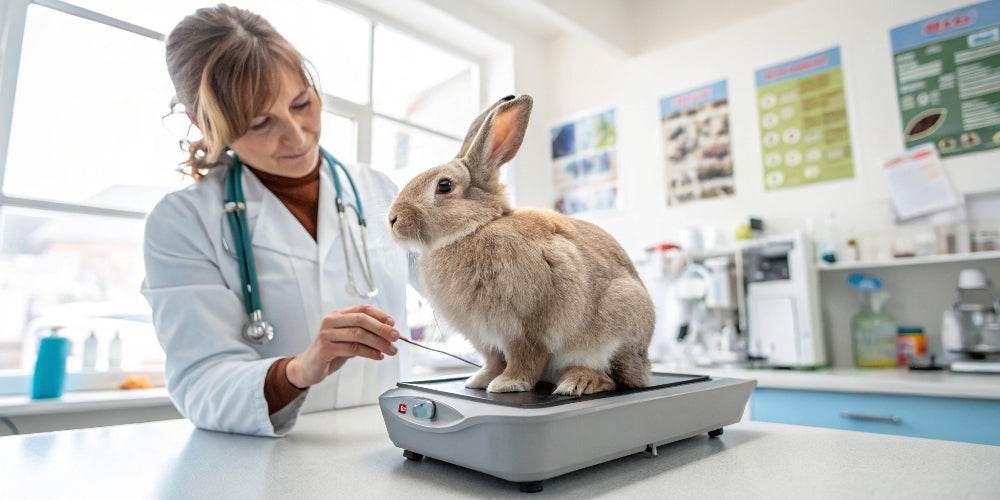
What are the main diseases of rabbits?
Rabbits are great petsThese are very tender, sweet, and loyal pets, especially for children who spend a lot of time at home and need to create emotional bonds. They adapt perfectly to the environments —both inside and outside the home—, and they can also live perfectly with young children since they are not aggressive and are small in size. Rabbits are very pleasant, docile and friendlyThere are also many rabbit breeds with different personalities and lifestyles, making them a perfect fit for what you're looking for. You shouldn't forget that these pets are naturally very smart and clean, as they love to groom themselves all day long—so it's hard for them to smell bad or get too dirty.
Now, rabbits, like other animals and pets, also tend to get sick. Rabbit diseases can be quite aggressive for pets, so it's important to pay special attention to their symptoms and treat them as quickly as possible or prevent them before they occur. In this article, we explain the main rabbit diseases—such as eye diseases in rabbits or ear diseases in rabbits—and how to tell if my rabbit has a cold, as well as the treatments. Read on for more information.
Rabbit Diseases: Which are the most dangerous?
The rabbits They are very delicate animals Because they have a weaker immune system than other pets, some diseases can be very harmful to their health if not prevented in time, especially viral diseases. These are the two most dangerous rabbit diseases, and to date, there is no treatment.
Myxomatosis in rabbits
Myxomatosis in rabbits is a disease caused by a virus known as poxvirus. It is primarily transmitted by the bite of arthropod insects, such as fleas, mosquitoes, or flies, although it can also be transmitted through infections caused by contact with other animals with the same disease. It is one of the eye diseases that affects rabbits. directly affects your eyelids —swelling them— and causing conjunctivitis. Myxomatosis also inflames the genitals of pets and causes skin lesions, in addition to causing diseases in the ears by inflaming them, but also pneumoniaThis disease causes a high mortality rate in pets, specifically between 8 and 15 days after the first symptom appears, so it must be prevented before the animal can become infected. The disease cannot be transmitted to humans.
Viral hemorrhage in rabbits or Viral Hemorrhagic Disease
Also known as Rabbit Hemorrhagic Disease (RHD). It is another of the most serious diseases that our furry friends can suffer from. This one, like the previous one, is spread by action of a virus known as calicivirus. This is one of the most feared rabbit diseases due to the high number of sudden deaths it causes. Its symptoms are usually identified when the rabbit has lack of appetite, restlessness, fever, or difficulty breathingViral hemorrhage in rabbits can be acquired from other infected rabbits, contaminated food and bedding, insects, the air, and even people. It is an untreatable disease that causes mortality of approximately 90% of young rabbits, being more common in wild rabbits. This disease is also not contagious to humans.
How do I know if my rabbit has a cold?
There are several diseases that can cause colds in rabbits. These are caused by the action of several different germs, which then cause the rabbit to get sick with the flu. Some of the most common diseases that attack the animal's respiratory system are:
- Colds in rabbitsIt is one of the most common pathologies in rabbits. Symptoms include sneezing, mucous membrane irritation, loss of appetite, discharge, and listlessness. It is treated with medication.
- PneumoniaAnother disease that affects rabbits with the flu. It's spread by a pneumococcus bacterium that reaches the lungs. Its symptoms are similar to those of the common cold, although it's more serious. Antibiotics are used to treat it.
- PasteurellosisPasteurellosis is transmitted through the inhalation of Pasteurella and Bordetella bacteria. Its most notable symptoms are sneezing and runny nose, very similar to those of a rabbit with the flu. To prevent it, keep the cage in good condition and avoid stressing your pet to prevent its immune system from weakening. This disease is treated with antibiotics.
Other diseases that affect rabbits
Rabbits can suffer from other diseases, depending on the bacteria, viruses and germs and the affected area. Thus, we can find diseases in rabbits' eyes, diseases in rabbits' ears, in the digestive system, in the skin... Some of these diseases are rabies, malocclusion, coccidiosis, coliform infection, enterotoxemia, giardiasis, rabbit ringworm, scabies... The most advisable thing, in any case - as long as you detect that your pet may have become ill - is consult a veterinarianSpecialists can determine what's wrong with your pet and what the most effective solution is.
Diseases transmitted by rabbits
Another reason it's important to consult a veterinarian if your pet is sick is to determine whether the rabbit's illness can be contagious to humans. These are the most common rabbit-borne diseases:
- TularemiaRabbit fever. This bacterial disease is associated with both rabbits and humans. A person can become infected by touching the animal, and symptoms can include ulcers where the virus has entered—usually on the hand—as well as swollen lymph nodes. If the bacteria are inhaled, the symptoms are very similar to pneumonia.
- CheyletiellosisThis mite causes localized or generalized dermatitis with multiple red bumps. Symptoms in humans disappear within three weeks.
- MicrosporidiosisThis parasitic disease can cause brain and kidney problems.
- Sporotrichosis: It is a fungus that can be transmitted by rabbits. It causes papules that turn into pustules.
The diseases transmitted by rabbits, as well as those that are not, are very varied. Therefore, it is best to visit a veterinarian.
Vaccines for rabbits: When should they be given?
To prevent fatal and incurable diseases in rabbits, such as myxomatosis and viral hemorrhage, it is best to vaccinate them. Rabbit vaccines should be given starting at 8 weeks of age and continued with annual doses. These vaccines help rabbits acquire immunity 3 weeks after administration and continue for a year. Nobivac myxo-RHD Plus It is part of the rabbit vaccines that protect pets from myxomatosis, RHD and RHDV2We can also find specific vaccines for each disease.


